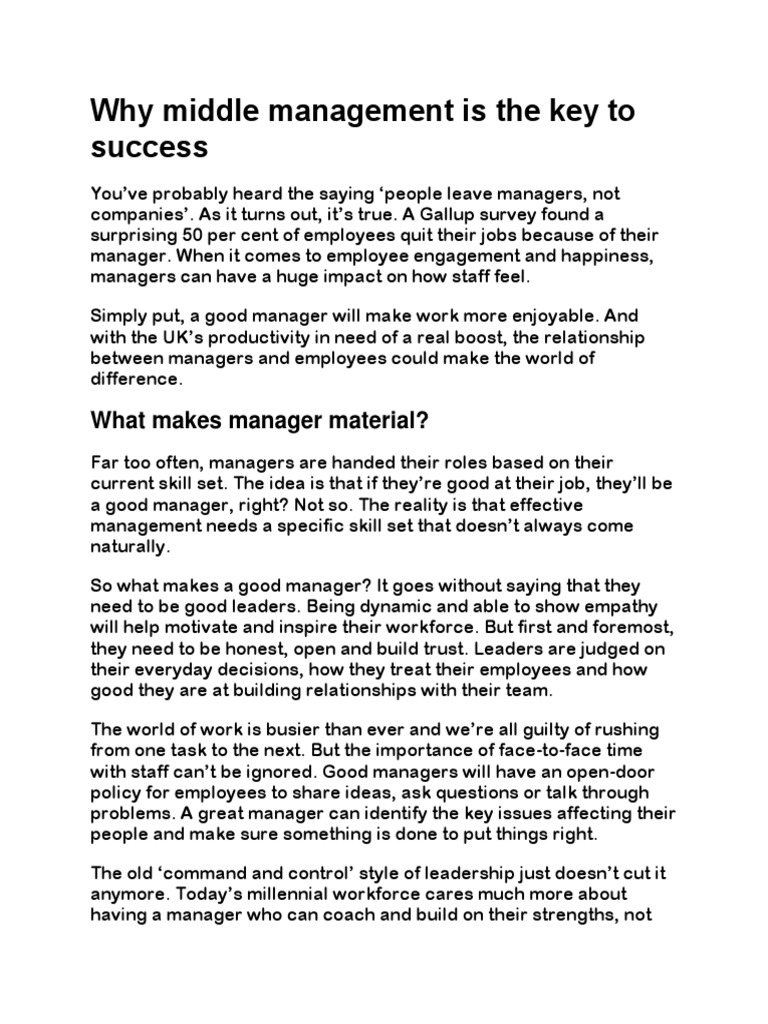Why Middle Managers Are Essential For Company And Employee Success

Table of Contents
Bridging the Gap Between Leadership and Employees
Effective middle managers serve as the crucial link between senior leadership and frontline employees. They act as translators, taking high-level strategic goals and breaking them down into actionable tasks and projects for their teams. This involves clear and consistent communication flowing in both directions. Senior leadership relies on middle managers to provide feedback on team performance, potential roadblocks, and employee morale. Simultaneously, employees depend on their middle managers for clear direction, support, and a pathway for their concerns to be heard and addressed.
- Effective communication and feedback mechanisms: Regular team meetings, one-on-one check-ins, and open-door policies are essential tools for maintaining transparent communication and gathering valuable feedback.
- Translating complex strategies into clear goals: Middle managers must possess strong analytical and communication skills to effectively explain and simplify complex company strategies for their teams.
- Addressing employee concerns and escalating issues effectively: Middle managers act as a buffer, addressing employee concerns promptly and escalating significant issues to senior management when necessary. This requires strong interpersonal skills and the ability to navigate difficult conversations.
- Mentoring and supporting junior employees: By providing guidance, feedback, and development opportunities, middle managers play a vital role in fostering employee growth and career advancement. This mentorship contributes significantly to retention and improves overall team performance.
Fostering a Positive and Productive Work Environment
Beyond task management, middle managers are instrumental in shaping a positive and productive workplace culture. They are responsible for fostering teamwork, motivating their teams, and resolving conflicts fairly and effectively. This requires strong leadership qualities, including empathy, fairness, and the ability to build strong relationships.
- Promoting teamwork and collaboration: Effective middle managers create opportunities for team members to collaborate and share knowledge, fostering a sense of shared purpose and accomplishment.
- Recognizing and rewarding employee contributions: Regular acknowledgement and appreciation of individual and team achievements significantly boosts morale and productivity.
- Addressing conflicts proactively and fairly: Middle managers must be equipped to handle conflicts swiftly and equitably, ensuring that disputes are resolved without damaging team cohesion.
- Creating a culture of open communication and trust: A culture of open communication, where employees feel comfortable sharing ideas and concerns without fear of reprisal, is crucial for a thriving workplace.
- Encouraging employee development and growth: Investment in employee training and development initiatives demonstrates a commitment to employee growth, increasing engagement and retention.
Driving Operational Efficiency and Productivity
Middle managers are directly involved in the day-to-day operations of their teams, making them key players in driving efficiency and productivity. They monitor performance, identify bottlenecks, and implement strategies to optimize workflows and resource allocation. This often involves streamlining processes, improving communication, and proactively solving problems.
- Streamlining processes and workflows: By identifying and eliminating unnecessary steps in workflows, middle managers can significantly improve efficiency and reduce waste.
- Monitoring team performance and identifying bottlenecks: Regular performance monitoring allows middle managers to identify areas for improvement and address potential bottlenecks before they significantly impact productivity.
- Implementing strategies to improve efficiency and productivity: This may involve introducing new technologies, implementing lean methodologies, or simply optimizing existing processes.
- Ensuring compliance with company policies and procedures: Middle managers play a crucial role in ensuring that their teams adhere to company policies, regulations, and safety standards.
- Proactive problem-solving and risk management: Effective middle managers are proactive in identifying and addressing potential problems before they escalate into major issues.
Developing Future Leaders and Talent
Middle managers are often the first line of contact for identifying and nurturing high-potential employees. They play a crucial role in mentoring, coaching, and providing training opportunities to help individuals develop their skills and advance their careers. This investment in future leadership is critical for organizational sustainability.
- Identifying and developing future leaders within the team: By recognizing and fostering the talent within their teams, middle managers contribute to the long-term success of the organization.
- Providing mentorship and coaching to junior employees: Mentorship and coaching provide guidance, support, and valuable insights, enabling junior employees to develop their skills and confidence.
- Facilitating employee training and development opportunities: Providing access to training programs and development initiatives helps employees enhance their skillsets and advance their careers.
- Creating a culture of learning and continuous improvement: A culture of continuous learning and improvement fosters innovation and adaptability, crucial elements in today's dynamic business environment.
- Delegation and empowerment of team members: Delegating tasks and empowering team members builds confidence and fosters a sense of ownership, ultimately boosting productivity and morale.
The Indispensable Role of Middle Managers
In conclusion, the role of middle managers is far more significant than often acknowledged. They are the bridge between leadership and employees, the drivers of operational efficiency, and the key players in fostering a positive and productive work environment. Their contribution to both company success and employee satisfaction is undeniable. Investing in robust training and development programs for middle managers is not just an expense; it's a strategic investment in the future of your organization. Recognize the value of your middle managers and invest in their growth to unlock greater company success and employee fulfillment. Effective middle management is key to a thriving organization. Don't underestimate their potential!

Featured Posts
-
 Remembering Sophie Nyweide Child Star Of Mammoth And Noah Dies At 24
Apr 24, 2025
Remembering Sophie Nyweide Child Star Of Mammoth And Noah Dies At 24
Apr 24, 2025 -
 Sk Hynix Emerges As Dram Leader The Impact Of Artificial Intelligence
Apr 24, 2025
Sk Hynix Emerges As Dram Leader The Impact Of Artificial Intelligence
Apr 24, 2025 -
 The Closure Of Anchor Brewing What Does It Mean For The Future
Apr 24, 2025
The Closure Of Anchor Brewing What Does It Mean For The Future
Apr 24, 2025 -
 Landlord Price Gouging In The Wake Of La Fires Reality Tv Stars Claims
Apr 24, 2025
Landlord Price Gouging In The Wake Of La Fires Reality Tv Stars Claims
Apr 24, 2025 -
 Mapping The Countrys Hottest New Business Locations
Apr 24, 2025
Mapping The Countrys Hottest New Business Locations
Apr 24, 2025
